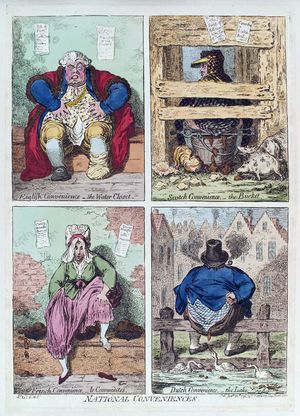Prejudice

A prejudice is a prejudgment: i.e. an assumption made about someone or something before having adequate knowledge to be able to do so with guaranteed accuracy. The word prejudice is most commonly used to refer to a preconceived judgment toward a people or a person because of race, social class, gender, ethnicity, age, disability, political beliefs, religion, sexual orientation or other personal characteristics. It also means a priori beliefs (without knowledge of the facts)[1] and may include "any unreasonable attitude that is unusually resistant to rational influence."[2] Both positive and negative prejudice exist; when used negatively "prejudice" implies fear and antipathy toward its subject, whilst when used positively can be used to describe intrinsic or subconscious preferences (such as tastes).
- Cognitive Prejudice refers to what people believe to be true. metaphysical or methodological philosophy at the expense of other philosophies which may offer a more complete theoretical explanation.
- Affective Prejudice refers to what people like and dislike: for example, in attitudes toward members of particular classes such as race, ethnicity, national origin, or creed.
- Behavioral Prejudice refers to how people are inclined to behave. It is regarded as an attitude because people do not act on their feelings. An example of cognitive prejudice may be found in expressions of what should be done if the opportunity presents itself.
These three types of prejudice are correlated, but all need not be present in a particular individual. Someone may believe that a particular group possesses low levels of intelligence, but harbor no ill feeling towards that group. A group may be disliked because of intense competition for jobs, but still recognize no differences between groups.
Racism has been defined as racial prejudice, combined with racial discrimination. By pre-judging a member of a race, or of an ethnic group, a racist decides how that person will act or speak and what sort of capabilities and potential he has. Even before meeting the person or learning anything about him, the racist then chooses to treat that person differently from others.
"Discrimination" is a behavior (an action), with reference to unequal treatment of people because they are members of a particular group. Farley also put discrimination into three categories:[3]
- Personal / Individual Discrimination is directed toward a specific individual and refers to any act that leads to unequal treatment because of the individual's real or perceived group membership.
- Legal Discrimination refers to "unequal treatment, on the grounds of group membership, that is upheld by law."[4] Apartheid is an example of legal discrimination against Black South Africans, as are also various post-Civil war laws in the southern United States that legally disadvantaged African Americans, with respect to property rights, employment rights, permission to pass a white residential area and the exercise of constitutional rights.
- Institutional Discrimination refers to unequal treatment that is entrenched in basic social institutions resulting in advantaging one group over another. The Indian caste system and European feudal system are historical examples of institutional discrimination.
As with prejudice generally, these three types of discrimination are correlated and may be found to varying degrees in individuals and society at large. Many forms of discrimination based upon prejudice are outwardly acceptable in most societies.
Contents |
Contemporary theories
Contemporary theories of intergroup bias (prejudice) tend to explain intergroup bias in terms of gay various social psychological motivations (Miles, Mark & Hazel, 2002). They are social identity theory, terror management and subjective uncertainty reduction theory.
Terror management theory
Solomon, Greenberg and Pyszczynski (1999) in their terror management theory proposed that people have a need for self-preservation which is raised and frustrated by their awareness of the inevitability of their own death. To deal with their mortality, people adopt a cultural world view that imbues subjective reality with stability and permanence and provides standards of value against which judgments of self-esteem can be made. According to Terror management theory, people evaluate in-group members positively because similar others are assumed to support, and therefore validate, their own cultural world view; in contrast, they evaluate out-group members negatively because dissimilar others are assumed to threaten their world view. There is extensive evidence that people show greater intergroup bias when they are made aware of their own mortality (Florian & Mikulincer, 1998).
Subjective uncertainty reduction theory
Moreover, Hogg (2000) in his subjective uncertainty reduction theory proposed that people are motivated to reduce subjective uncertainty by identifying with social groups, which provide clear normative prescriptions for behaviours and thus imbues people with a positive valence. Some evidence shows that manipulations of subjective uncertainty influence levels of both in-group identification and intergroup bias. For example, a positive relationship has been found between the need for closure and both in-group identification and intergroup bias (Shah et al. 1998).
For further interest, reader may refer to introduction to social psychology by Vaughan and Hogg (2005) or Annual Review of Psychology.
Sociology
Sociologists termed prejudice an adaptive behaviour. Biased views may be important at times for survival. There is not always enough time to form a legitimate view about a potential foe before adopting a defensive stance that could save lives. Prejudice is non-adaptive when it interferes with survival or well-being.
Common misconceptions
At times, the terms prejudice and stereotype might be confusing:
- Prejudices are abstract-general preconceptions or abstract-general attitudes towards any type of situation, object, or person.
- Stereotypes are generalizations of existing characteristics that reduce complexity.
See also
- Idée fixe
References
- ↑ William James wrote, "A great many people think they are thinking when they are merely rearranging their prejudices."Quotes -- Courtesy of The Freeman Institute
- ↑ Rosnow, Ralph L.; Poultry and Prejudice. Psychologist Today, (March, 1972): p. 53.
- ↑ Farley, p. 16
- ↑ Robertson, p. 204
|
||||||||